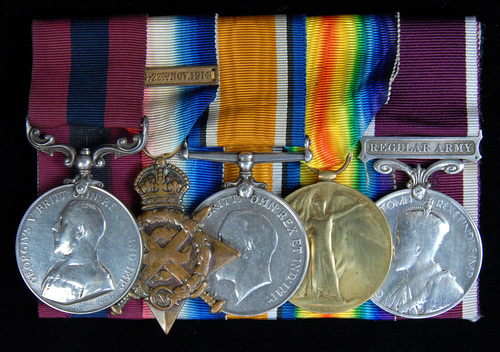
Auction: 14003 - Orders, Decorations, Campaign Medals and Militaria
Lot: 16
A Fine 1914 'Battle of La Bassée' D.C.M. Group of Five to Driver H.T. Cox, Army Service Corps, Later Sergeant, Royal Inniskilling Fusiliers, Attached 7th Field Ambulance Royal Army Medical Corps, For Conspicuous Gallantry Near Neuve Chapelle, 29.10.1914, When, Despite Being Exposed to Enemy Fire, He Brought His Horsed Ambulance Wagon Up To the German Front Line on Two Occasions And Assisted in the Evacuation of Wounded Men From the Royal West Kent Regiment
a) Distinguished Conduct Medal, G.V.R. (T.25142 Dvr: H.T. Cox. A.S.C.)
b) 1914 Star, with Bar (T-25142 Dvr: H.T. Cox. A.S.C.)
c) British War and Victory Medals (T-25142 T. Sjt. H.T. Cox. A.S.C.)
d) Army Long Service & G.C., G.V.R., with 'Regular Army' bar suspension (...Sjt. H.T. Cox. D.C.M., R. Innis. Fus.), obverse of medals polished and worn, therefore fine, the reverses better (5)
D.C.M. London Gazette 18.2.1915 T/25142 Driver H.T. Cox, Army Service Corps
'For conspicuous gallantry and devotion to duty at Neuve Chapelle, when he brought his wagon up on two occasions in front of the German lines and thereby enabled his section to remove our wounded, who would otherwise have been left in the enemy's hands'.
T-25142 Sergeant Henry T. Cox, D.C.M., enlisted in the Army Service Corp, April 1907; served during the Great War on the Western Front from 15.9.1914, attached to the 7th Field Ambulance Royal Army Medical Corps; awarded the Distinguished Conduct Medal for his conspicuous gallantry at Neuve Chapelle, 29.10.1914, when he brought his horsed ambulance wagon close to the German front line on two occasions under a heavy fire, and assisted in the evacuation of wounded men from the Royal West Kent Regiment, and also a number of Indian soldiers who had sought refuge in an isolated farm building following their attack and withdrawal from Neuve Chapelle the previous day- the following report by Major T.E. Fielding was entered into the 7th F.A. War Diary for the 29th October: 'At 4pm I received a message from the D.A.D.M.S 3rd Division to bring all bearers and ambulance wagons to Divisional Headquarters with a view to going to Neuve Chapelle to clear that village of wounded which had been left behind after an encounter with the enemy during the night... I left all the RAMC personnel and transport at this point, under the command of Captain McQueen and went forward to Brigade HQ at Richebourg to learn the situation and receive instructions. Brig-Gen McCracken gave me verbal orders as to the road to take, the furthest point forward for the ambulance wagons and instructed me to get into communication with the O.C. 1st Bedfords (Major Allason), and having obtained all available information from him, to use my own discretion as to further action. In conclusion, Gen McCracken told me I was not to expose my command to unnecessary risk of loss... The personnel with Lieut Smith and myself proceeded along the main road running south-east from Pont Logy until we came into touch with the Cheshire Regiment. As we passed the dividing line between the Cheshires and the Bedfords, firing broke out chiefly from our own trenches, but, in a few moments, this fire was returned by the enemy and it became necessary to take cover. For about three-quarters of an hour, we were compelled to remain stationary, but, after that time, as the firing had practically ceased, we proceeded on our way and I found the Bedfordshire Regiment and saw Major Allason. He told me that Neuve Chapelle was occupied by Germans who had been firing on our own troops during the evening, and that it was inadvisable to send bearers into the village... I decided that it was impossible to take bearers into Neuve Chapelle without running the risk of incurring serious losses, and I accordingly made the following arrangements... an officer of the Royal West Kent Regiment lent me a guide to show me where some of his own wounded were and I collected these as well as some Indians who had been left in a farmhouse on the Neuve Chapelle road. Altogether we picked 16 wounded including 4 Indians. These were taken by hand carriage to the ambulance wagons... As we retired, the firing began again and we soon found we were still within range, for two wagons were hit, although neither men nor horses were injured'.
Cox subsequently transferred to the Royal Inniskilling Fusiliers and advanced Sergeant; awarded Long Service & Good Conduct Medal, 18.9.1931; discharged 1933.
Subject to 20% VAT on Buyer’s Premium. For more information please view Terms and Conditions for Buyers.
Estimate
£1,200 to £1,600




